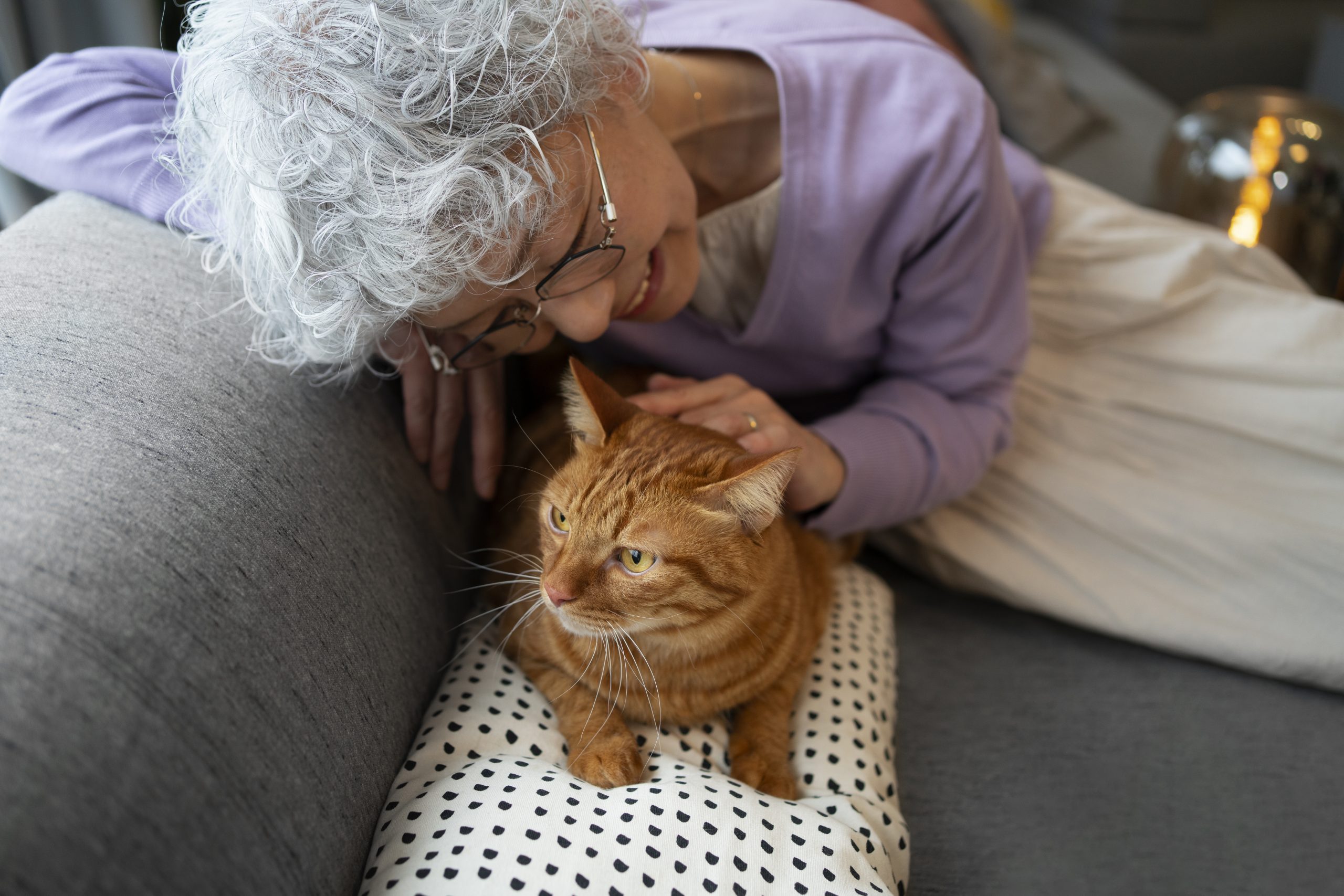Introduction
Loneliness is one of the most common and under-recognized challenges among older adults in the United States. According to recent studies, over 35% of adults over 65 report feeling lonely on a regular basis, which can contribute to stress, anxiety, depression, and even physical health decline. While social programs and community activities help, an unexpected companion is proving to make a significant difference: the humble cat.
Cats offer more than cute companionship—they provide emotional support, stress relief, and cognitive stimulation that can significantly improve quality of life for older adults. In fact, research shows that cat ownership is linked to reduced feelings of isolation, better mood regulation, and even enhanced verbal memory skills. For seniors seeking companionship, emotional comfort, or a daily routine, cats can be transformative.
The Science of Cats and Senior Well-Being
Studies conducted by the University of Rochester Medical Center and other institutions have found that seniors with pets, particularly cats, report lower levels of loneliness and depressive symptoms compared to those without pets. Cats offer calming presence and companionship without the physical demands often associated with dogs.
Researchers have observed that interacting with cats can:
-
Reduce stress hormones like cortisol
-
Increase oxytocin, the “bonding hormone”
-
Improve heart rate variability, indicating better cardiovascular and emotional health
-
Stimulate mental engagement through play and care routines
These effects are especially important for older adults who may face mobility limitations, making it harder to engage in outdoor or physically demanding activities.
Cats as Emotional Support
Cats are known for their soothing, independent yet affectionate nature. Unlike other pets, cats often offer non-demanding companionship, allowing seniors to feel cared for without overwhelming responsibilities. The rhythmic sound of a cat’s purr alone has been linked to stress reduction and even minor therapeutic effects on blood pressure and anxiety.
This combination of emotional support and calm presence makes cats uniquely suited to help seniors manage loneliness, depression, and anxiety—conditions that are often underdiagnosed but widespread in older populations.
Daily Routines and Mental Engagement
Caring for a cat establishes a daily routine that promotes structure and purpose. Even small tasks like feeding, grooming, and playing with a cat provide mental engagement and a sense of accomplishment.
For example:
-
Feeding times create predictable schedules that support cognitive health
-
Interactive play with toys stimulates problem-solving and memory
-
Grooming and petting enhance tactile senses and emotional bonds
Unlike puzzles or brain games that can feel forced or repetitive, caring for a cat is emotionally rewarding and intrinsically motivating, which can make seniors more likely to engage consistently.
Cats and Cognitive Benefits
Though dogs are often credited with increasing physical activity, cats have their own cognitive advantages for seniors. Research indicates that cat owners may experience improved verbal memory, attention, and delayed recall, likely due to the combination of routine, emotional engagement, and stress reduction.
In practical terms, interacting with a cat—remembering feeding times, tracking medication schedules for the pet, or training cats for simple behaviors—can stimulate memory, executive function, and focus. For older adults, these mental exercises are both gentle and highly effective in promoting brain health.
Social Benefits for Seniors
Cats also have an indirect social benefit. Owning a cat can foster connections with family, neighbors, and fellow cat enthusiasts. Social interactions might occur naturally, such as:
-
Sharing stories about pets with friends or community members
-
Discussing cat care tips online or in local clubs
-
Inviting neighbors or family to help with cat care
Even casual social contact can reduce feelings of isolation and strengthen emotional resilience, which is critical for mental and physical health in older adults.
Choosing the Right Cat for Older Adults
When considering adopting a cat, seniors should assess lifestyle, mobility, and personal preference:
-
Age of the cat: Older adults may prefer adult cats over energetic kittens, as they are often calmer and easier to manage.
-
Temperament: Some cats are more independent, while others are affectionate lap companions—choose a temperament that fits daily routine.
-
Health considerations: Cats with chronic medical issues may require more frequent vet visits, which could add stress.
Adoption from shelters is highly recommended, as older cats are often overlooked but provide loving companionship that is ideal for seniors.
Success Stories
Consider Ruth, a 70-year-old retiree from Florida. After her husband passed, she felt increasingly isolated. Adopting a gentle, senior cat named Whiskers changed her daily life. “Having Whiskers makes me feel needed,” she says. “I talk to him, play with him, and just having him around keeps me smiling and active.”
Another story comes from George, 68, who found that caring for his cat improved his daily routine and sleep patterns. The presence of his cat reduced stress and gave him a sense of purpose, which positively affected his overall mental health.
These real-life examples highlight that the benefits of cat ownership are not theoretical—they are tangible and life-enhancing for seniors.
Health Benefits Beyond Emotional Support
The calming effects of cats extend beyond mental well-being. Research has linked cat companionship to:
-
Lowered blood pressure and heart rate
-
Reduced risk of cardiovascular events
-
Better management of anxiety and depression
-
Enhanced immune function through reduced stress
These physiological effects, combined with emotional and cognitive benefits, demonstrate that cats can be a holistic approach to healthy aging.
Final Thoughts
Cats are more than pets; they are companions, therapists, and motivators rolled into one. For older adults, particularly those living alone, a cat provides:
-
Emotional stability and stress relief
-
Mental stimulation and cognitive engagement
-
Companionship and reduced feelings of loneliness
-
Health benefits that extend to both mind and body
In short, adopting a cat after 65 isn’t just about companionship—it’s about improving overall quality of life, one purr at a time.

James Jenkins is a celebrated Pulitzer Prize-winning author whose work has reshaped the way readers think about social justice and human rights in America. Raised in Atlanta, Georgia, James grew up in a community that instilled in him both resilience and a strong sense of responsibility toward others. After studying political science and creative writing at Howard University, he worked as a journalist covering civil rights issues before dedicating himself fully to fiction. His novels are known for their sharp, empathetic portraits of marginalized communities and for weaving personal stories with broader political realities. Jenkins’s breakout novel, Shadows of Freedom, won national acclaim for its unflinching look at systemic inequality, while his more recent works explore themes of identity, resilience, and the fight for dignity in the face of oppression. Beyond his novels, James is an active public speaker, lecturing at universities and participating in nonprofit initiatives that support literacy and community empowerment. He believes that storytelling is a way to preserve history and inspire change. When not writing, James enjoys jazz music, mentoring young writers, and traveling with his family to explore cultures and stories around the world.








